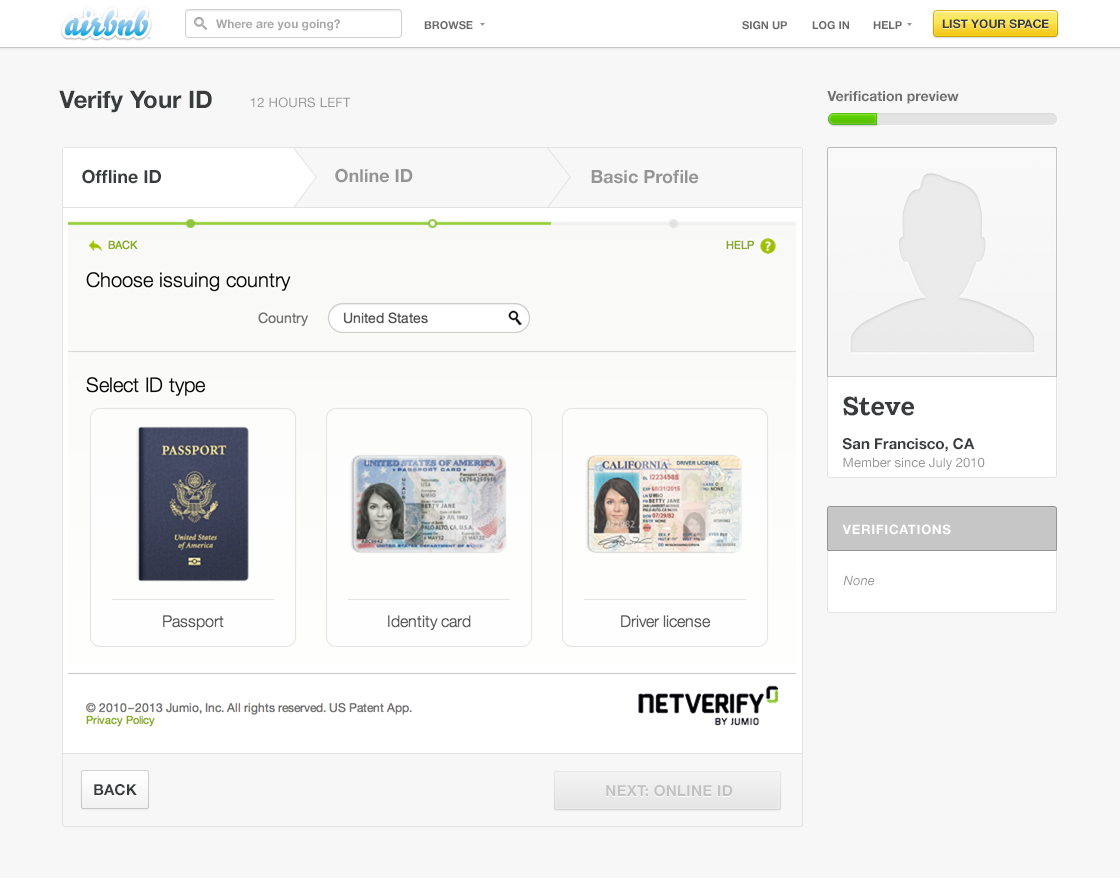Airbnb took a very big bet against anonymity, and is one of the most, if not the most intrusive hotel booking websites.
Going further than any significant consumer tech company has before, the peer-to-peer travel accommodation site, valued at $2.5 billion, wants to combine users’ online and offline identities with a process that includes checking official photo IDs.

They collect your data, and share it with inteligence agencies, while claiming it would better foster a service where users are on their
best behavior and feel comfortable trusting each other to stay in their
homes, Airbnb doesn't mind offending privacy defenders and the loss of
users that comes from the friction of a more complicated registration
process. Maybe the ClA will reimburse Airbnb. But the question I have to ask is, wouldn't it also foster a service where users are on their best behavior and feel comfortable trusting each other to stay in their homes if the landlord, rather than Airbnb collect your ID?
“We are drawing a line here and saying we don’t stand for anonymous
experiences,” Airbnb CEO Brian Chesky said in an interview last week at
the company’s San Francisco headquarters. “We don’t think you can be
trusted in a place where you’re anonymous.” But wait, hotels.com, Orbitz, and Travelocity, some of the biggeset sites out there allow anonymous bookings. So why do they trust guests, while Airbnb doesn't? The big booking sites in China also do not ask for ID.
A totalitarien Airbnb process will require users to show that they are a real established online person (through a history of participation and an active existing network on Linkedin or Facebook, or three positive reviews from previous Airbnb stays) and a real established offline person (by scanning their photo ID with the Airbnb mobile app or providing personal details as they would with a credit check).
To be verified by Airbnb, users must connect those online and offline records under the same name.
Years ago, 25 percent of Airbnb’s U.S. users were told they have to do this before they can further participate. Any other user can opt into the process, and hosts will be able to say they only rent to verified users.
Today, all Airbnb users must be verified in order to book rooms.
For context, Chesky drew historical excuses to sites like eBay — where users establish a reputation with a pattern of positive transactions — and Facebook — where users are expected to participate using their real names. But he claimed that those virtual identities are brittle, because people with tarnished reputations can just delete their old account and start new ones. Attaching their offline identity would make it a lot harder to do that.
“I’m not saying the whole world will work this way,” Chesky explained, “but with Airbnb, people are sleeping in other people’s homes and other people’s beds. So there’s a level of trust necessary to participate that’s different from an eBay or Facebook.”
Once again, why is Airbnb collecting the ID? Why not let the landlord directly collect the ID? When you check into a traditional hotel, it's the hotel front desk who collects the ID. That would seem to make more sense.More excuses
Airbnb uses an example where an Airbnb host saw her apartment trashed, the company seized the opportunity to introduce draconian rules and regulations. On the surface, they claimed to introduce commitments to trust and safety, including better customer services and claims to guarantee to cover $1 million in property damage. This is the biggest move in that direction. Underneath that deception lies something more sinister.
They want to know who you are an your pattern of life matrices.
As Chesky describes it, Airbnb’s verified accounts will be a larger step forward for the networked world. This is a "necessity" for the shared economy, he said. So, while today verified accounts may improve trust between Airbnb users, tomorrow they might be a sort of passport between the online and offline world for other services, as well.
What's most disturbing is the security risk that comes with allowing websites like Airbnb operate in China. They can collect ID, and passports of Chinese nationals, and no one really knows what Airbnb does with the information.
What would the western corporate media say if a Chinese website was collecting ID's on westerners?






Comment